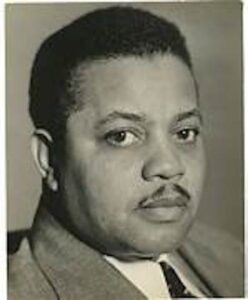
James W. Ford
*James W. Ford was born on this date in 1893. He was a Black labor activist and a politician.
Ford was born in Pratt City, Alabama. His father, a former resident of Gainesville, Georgia, had come to Alabama in the 1890s to work in the coal mines and steel mills. He worked for 35 years as a coal miner for the Tennessee Coal, Iron, and Railroad Company. Ford's mother was a domestic worker. At an early age, Ford lost his grandfather, who was burned alive in a lynching for supposedly being too closely acquainted with a white woman.
Young Ford got his first job at age 13, working on a railroad track in Ensley, Alabama. Here, they were paid less than white workers and were given the dirtiest tasks. He later worked as a Blacksmith's helper at a steel plant, a machinist's helper, and a laborer at a blast furnace. Ford worked his way through high school before attending Fisk University.
Just before graduating in 1917, Ford enlisted in the U.S. Army to support the American war effort in World War I, believing that fighting in the war would help win freedom for Black Americans back home. He entered the signal corps with the 325th Field Signal Battalion of the 92nd Infantry Division in France. Ford quickly became disillusioned with military service, seeing it as an extension of the Jim Crow policies which he sought to fight at home. Among the discrimination Ford witnessed within the Army were false rape allegations levied against Black soldiers who spoke up against their ill-treatment. In the Army, Ford helped organize protest meetings among Black soldiers to advocate for their rights and protections. Ford saw World War I as an imperialist war that served the interests of Wall Street and big banks. At the end of the war, Ford was discharged from the Army and returned to civilian life.
Ford returned to America as a skilled radio operator but was unemployed because he was black and worked at a mattress factory in Chicago. Ford then worked as a parcel post dispatcher for the United States Post Office, joining the Union of Post Office Workers (UPW Local 1). Ford became active in his local union, earned the trust of black and white workers, and was a delegate to the Chicago Federation of Labor. In his work with the CFL, and the National Negro Congress, Ford fought against segregationist policies pushed by the leadership of various unions.
While working at the post office, Ford was drawn to the CPUSA's political message, particularly its call for self-determination for Black Americans. However, federal officials feared his ability to unify Black and White workers along class lines, and Ford was ultimately fired from his job at the post office. James W. Ford died on June 21, 1957.